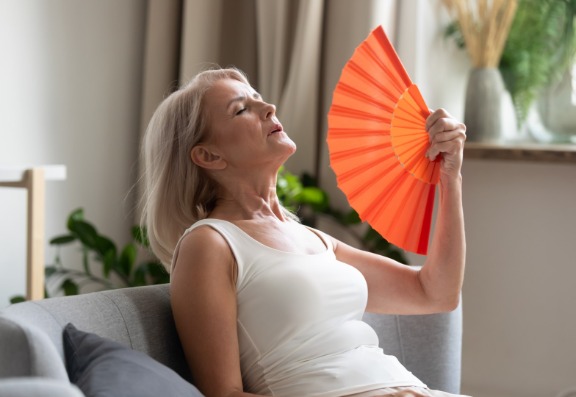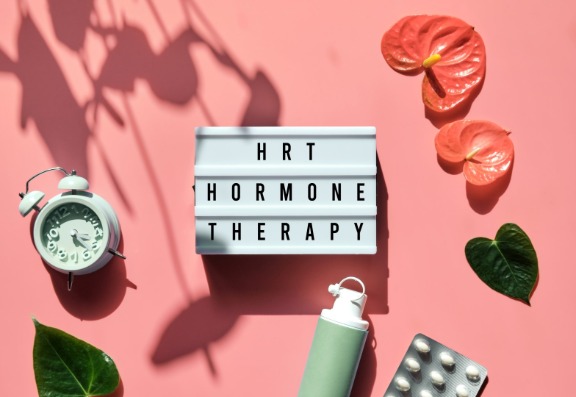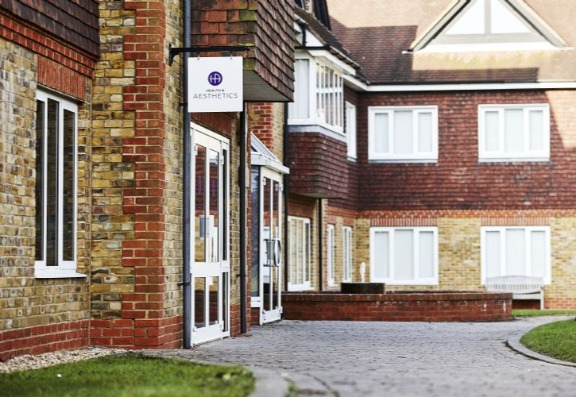Menopause is a natural part of the ageing process that most women experience between 45 and 55 years old.
Dealing with the uncomfortable and irritating symptoms can be challenging but when it happens prematurely, it can be a huge shock.
If left untreated, the host of physical effects can disrupt romantic relationships, trigger complex feelings and make day-to-day activities distressing.
To manage symptoms safely and avoid health risks, you should seek medical advice. Many women avoid visiting a doctor out of sheer embarrassment but you don’t need to suffer in silence or go through it alone.
What is early and premature menopause?
When a woman’s ovaries cease to function, the menstrual cycle permanently ends. A woman is considered menopausal once the periods have stopped for 12 months.
In a survey conducted by Health & Aesthetics, over a third of women didn’t know the difference between premature and early menopause, while a quarter confessed they weren’t aware of what either is.
The average age for women in the UK to experience menopause is 51. However, going through it between the ages 40 and 45 is referred to as early menopause, while premature menopause is when it occurs before the age of 40.

Why does it happen?
Although the cause of premature and early menopause can’t always be found, there are several possible causes, including:
What are the symptoms?
The main symptom of early menopause is the changes to your periods. They may become infrequent before completely stopping within a few months or a year. They can also stop suddenly.
Other menopausal symptoms can include hot flushes, vaginal dryness, fatigue, sleep problems, night sweats and a loss of libido. These symptoms might start months or sometimes years before your periods halt.
In cases of early and premature menopause, symptoms can be more intense and inconsistent.
Unexpected menopause may also trigger some complicated emotions which should be discussed with a counsellor.
Are there any effective at-home remedies?
Menopausal women can stay cool and fight off hot flushes and night sweats with cold showers, light clothing, fans and cold drinks. A healthy diet and regular exercise can also reduce these symptoms. You should also avoid smoking and consuming spicy foods, caffeine and alcohol.
Vaginal dryness can cause irritation, discomfort and pain during sex, which is a huge part of life for many women. However, applying lubricant and vaginal moisturisers can provide temporary relief and make intercourse more comfortable.
Many consider vaginal dryness a sign of ageing, which can cause feelings of embarrassment for young women experiencing premature menopause. But vaginal dryness can affect women of all ages, even before menopause.
It isn’t anything to be ashamed of and shouldn’t be ignored.

What medical treatments can ease the symptoms?
Hormone replacement therapy (HRT) restores hormones that the ovaries are no longer producing.
The treatment is administered to alleviate menopausal symptoms such as vaginal dryness, hot flushes, and night sweats and to minimise the risk of osteoporosis and heart disease.
However, it can cause several side effects such as headaches, breast tenderness, vaginal bleeding, and nausea. It can also increase the risk of thrombosis, breast cancer, strokes, and other serious conditions.
Non-Surgical Vulvo-Vaginal Rejuvenation, known as Femilift, can be used in combination with HRT. It stimulates collagen production by using a laser to tighten and rejuvenate the vaginal tissue. Femilift is a long-term solution for menopausal symptoms that affect the vagina such as severe dryness and stress incontinence and can improve the patient’s sex life by increasing sensation
This pain-free treatment only takes up to 15 minutes and doesn’t require any recovery time, making it perfect for those with a busy schedule. Results can last between 12 and 18 months when three treatments are carried out.
Premature and early menopause can be extremely distressing. However, controlling the symptoms with effective medical treatments can hugely improve your quality of
If you want to read more, the experts at Consulting Room really know what they're talking about and have put together some Hormone replacement therapy (HRT), Non-Surgical Vulvo-Vaginal Rejuvenation, and Femilift FAQs just for you.
If you have more questions, you can use the Hormone replacement therapy (HRT), Non-Surgical Vulvo-Vaginal Rejuvenation, and Femilift questions feature to talk to our panel of trained medical experts.
If you're keen to get started with this treatment right away then you're in luck - those clever folks also have a list of trusted, accredited Hormone replacement therapy (HRT), Non-Surgical Vulvo-Vaginal Rejuvenation, and Femilift clinics in your area.
Many thanks to Dr Rekha Tailor for this amazing blog who is the founder and Medical Director of Health & Aesthetics.
Dr Tailor is one of the UK’s leading non-surgical cosmetic specialists, having combined her extensive clinical expertise and artistic flair to specialize in Aesthetic Medicine, and is known for her light touch and incredibly natural-looking results.
She has received specialist training in the use and administration of all products and treatments offered by the clinic. She is a full member of the British College of Aesthetic Medicine (BCAM) and the Royal College of General Practitioners (RCGP).

Ahead of Menopause Awareness Month, an expert shares her unique approach to skincare during menopause: the Menopause Skin Map.
In a society where female health issues have long been misunderstood, under-prioritised, or flat-out ignored, Dr. Jenkins brings clarity, compassion, and an unwavering commitment to education and empowerment.
From night sweats to anxiety, the list of symptoms can be as long as your arm. That is why it is so important to speak up and break the taboo around talking about Menopause...
Hey, wait!
Before you go.....
Let's stay in touch, pop your details here and we'll send our editor's hand-picked updates on your fave subjects.